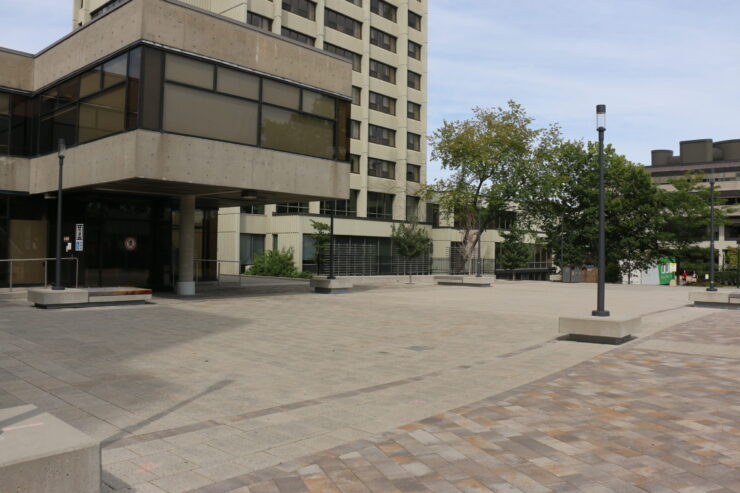Senate will engage in ‘lively discussion’ prompted by province’s new differentiation policy
Photo by Adam Feibel
It’s time for the University of Ottawa to decide “what it is we’re going to be known for,” according to university president Allan Rock.
In the coming months, the Senate will discuss the areas in which the university can focus its programming. According to Rock, the U of O may soon see further specialization in certain programs of study, particularly health, science, and public policy.
The discussion was prompted by a Government of Ontario framework proposal that was leaked in late September, which urged universities to specialize or risk losing provincial funding.
The document, entitled “Ontario’s Proposed Differentiation Policy Framework: Draft Discussion Paper” and marked confidential, urged universities to choose particular areas of focus and narrow their programming to become more specialized and differentiate themselves from other universities.
“There are 20 universities in Ontario, and what they don’t want to do is have 20 identical universities,” said Rock.
This year, the U of O was ranked eighth place overall among the top 50 research universities in Canada by Research Infosource. Within that field of research, there are a few areas in which the university stands out.
“There are themes emerging around the campus where we are best in class,” he said. “I think focusing on those areas … and making those the defining characteristics of the university in the years ahead, I think that’s the direction in which we’re going to be moving.”
Rock called the U of O a “powerhouse” in health education and said it will “clearly be one of our areas of focus.” The U of O is currently ranked second in Canada in health research, behind the University of Toronto.
“In health, we do things that are not done anywhere else,” he said. “Our focus in neurosciences, in stem cell, in areas like cardiology with the Heart Institute, are some of the best in the country, and indeed some of the best in the world.”
The Heart Institute is Canada’s largest cardiovascular health centre and, along with the Ottawa Hospital, recently moved to fourth place from sixth in the national Top 40 Research Hospital Rankings, published by Research Infosource. The university is also in talks about instituting a new school of pharmacy.
Rock also emphasized the university’s research in science, particularly its “fabulous team” in photonics that includes Paul Corkum, Canada Research Chair in attosecond photonics, and Robert Boyd, the university’s new Canada Excellence Research Chair. The five-storey, 14,000-square-metre Advanced Research Complex, which will house the Centre for Advanced Photonics, is scheduled to be completed as early as the summer of 2014. The U of O also has a joint lab with the Vollmer Lab of Nanophotonics and Biosensing at the Max Planck Institute for the Science of Light in Erlangen, Germany.
Additionally, the U of O boasts the largest law school in Canada. In the 2013 Maclean’s Canadian Law School Rankings, the U of O’s common law school was ranked 10th in Canada out of 16 and the civil law school was ranked third out of six. This summer, Rock also announced plans to introduce Canada’s first school of government at the U of O as early as 2015.
These three areas have been highlighted in the Senate’s long-term agenda. Rock said the Senate will have to engage in “lively discussion” and make difficult choices regarding specialization in the months to come.
Interestingly, the U of O’s journalism program has also come up in the conversation.
After an internal report to the Senate in May 2012 revealed the program to be “profoundly troubled,” a university committee decided to suspend admission to the program for the 2013–14 school year in order to make improvements to the program.
Rock used the journalism program as an example of a program that may get the cut in order to allow another university to take the lead while the U of O focuses its attention elsewhere.
“If somebody else does journalism best, maybe they should be left to do journalism,” said Rock.
Just across town, Carleton University is regarded as one of the top universities in Canada for journalism.
“What about if we do pharmacy, they do journalism,” he said. “They’ve got architecture, we’ve got health sciences.”
However, Rock pointed out that Carleton doesn’t offer journalism training in French. He said the U of O could think about offering a French journalism program in partnership with La Cité collégiale—the only one offered in Ontario—but limiting it to that.
“That’s the kind of discussion the province is encouraging,” he said.
“Maybe some things have to fall away while we focus on the things we do best.”




